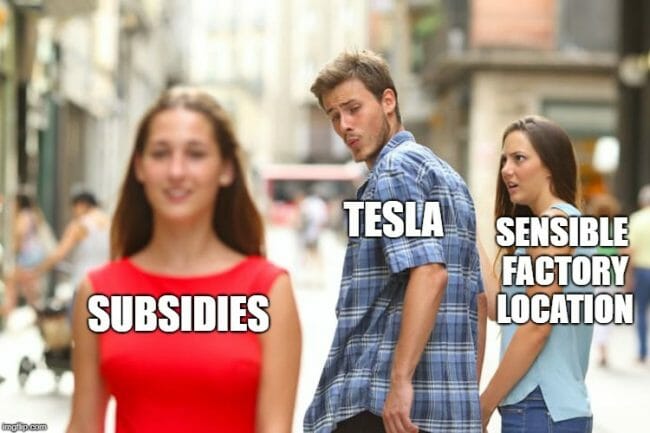Relocation Subsidies, Short-Term Thinking, And Why Bezos is Smarter than Musk
I will begin by saying that few things in government aggravate me more than corporate relocation subsidies. They are an entirely negative sum game. I believe that subsidies are misguided and lead to a misallocation of capital, but at least things like EV subsidies create an EV industry, even if it is uneconomic. But relocation subsidies are payments to create nothing -- their entire purpose is to move economic activity that would happen anyway across some imaginary line on a map. Locally, we had a $100 million subsidy to a developer to move a mall approximately 1 mile. Pure insanity.
However, it is hard for me to blame the managers of public companies who seek these subsidies. I own my own company and can easily eschew such pork (if it were ever offered to me) but the CEO of a public company would be failing in their fiduciary duty to their shareholders to not accept government money that the drunken sailors in government are so gleefully trying to stuff in corporate g-strings.
With this money so available, it is important that corporate management make location decisions considering these subsidies but not solely focused on them. The contrast between Amazon and Tesla (including the former SolarCity) helps explain my point.
In finding new headquarters locations, Amazon's most important considerations were likely
- Ability to attract great management and developer talent who seem to be more attracted to hipster areas with lots of Starbucks and sushi more than to areas with low cost housing.
- As they incur regulatory scrutiny, closeness to national government
- Access to domestic and international partners
- Access to capital
Note these criteria do not include access to low cost labor and real estate. These do not really matter much for its headquarters offices. These DO matter for distribution centers and warehouses, which is why these are located not in the center of high cost cities but in low cost suburban or rural areas. In this context, then, splitting its headquarters between New York and Washington DC make a ton of sense.
Now let's think about Tesla. Tesla was looking for manufacturing locations for solar panels and cars. This is in an era when few even consider anywhere in the US a viable long-term option, but Tesla selected New York state and southern California. I can tell you from sad personal experience that both these places are among the most expensive and hardest places to do business in the country. Seriously, in SoCal Tesla took over a facility that Toyota couldn't make work. These make absolutely no sense as long-term locations for manufacturing, but Tesla came here none-the-less in part for big fat subsidies and in part to ingratiate two powerful sets of state governments (in addition to subsidies, California reciprocated by giving Tesla a special sweetheart deal upping its zero emission vehicle credits).
I am reminded of this because Bloomberg has the whole, sad tale of Tesla in New York here.
I am not much on memes but I thought I would try my hand just this once...
